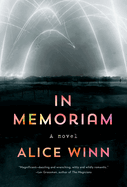
Two English boarding school students in the mid-1910s have nearly everything working against them in Alice Winn's assured debut novel, In Memoriam. Preshute College classmates Henry Gaunt and Sidney Ellwood have advantages; both, for instance, come from privileged backgrounds. But they're also gay and attracted to one another at a time in Britain in which it is illegal. Then World War I breaks out, an event that has special resonance for Jewish Ellwood and part-German Gaunt. Soon, Gaunt has enlisted ("If we have a son in the army, no one will dare say we are not patriotic," his mother tells him), and Ellwood, who is fond of quoting such Tennyson poems as "In Memoriam A.H.H.," reluctantly follows.
Much of this novel takes place on and around battlefields, including Flanders and the Somme, and depicts the conflicts Gaunt and Ellwood endure--the atrocities of war and the personal challenges of navigating their love. The novel takes a while to get going but, once the war begins, Winn displays a sure touch. The prose isn't elegant, but Winn makes up for this with brisk pacing and jam-packed scenes that address the English class divide, antigay and antisemitic sentiments and more. She excels at writing battle scenes in which cinephiles will detect the influence of such films as The Grand Illusion and The Great Escape. Late in the novel, Ellwood says, "I do think it's peculiar, how much more drawn people are to disaster than to beauty." As Winn instinctively knows, if the goal is to clear a path to beauty, start by eliminating the calamities and prejudices that block the way. --Michael Magras, freelance book reviewer

